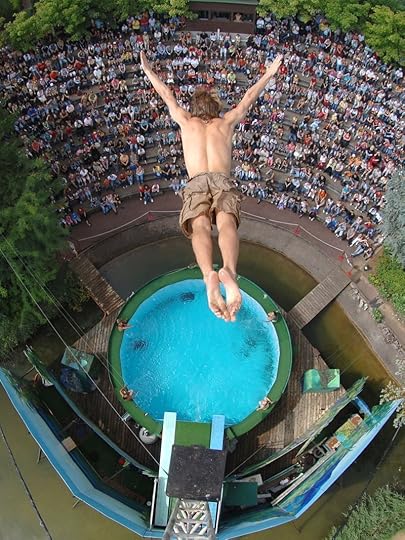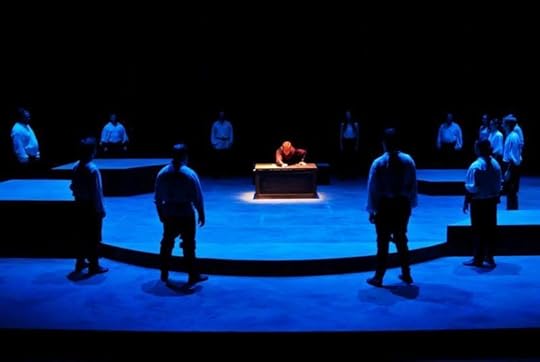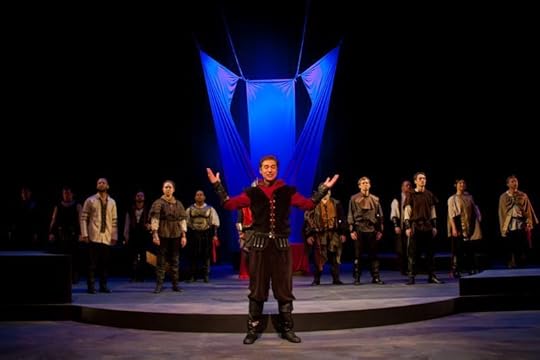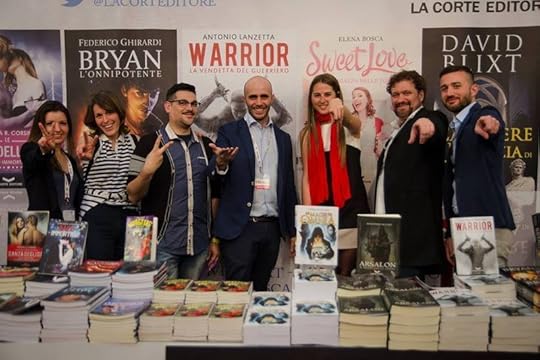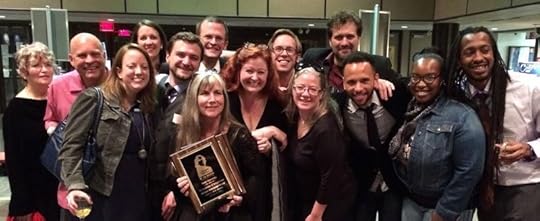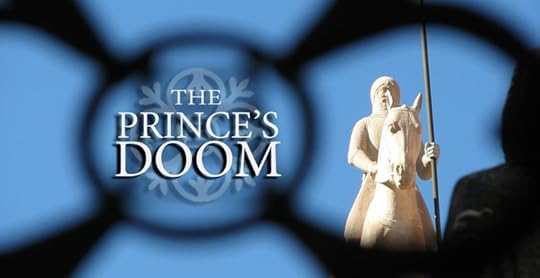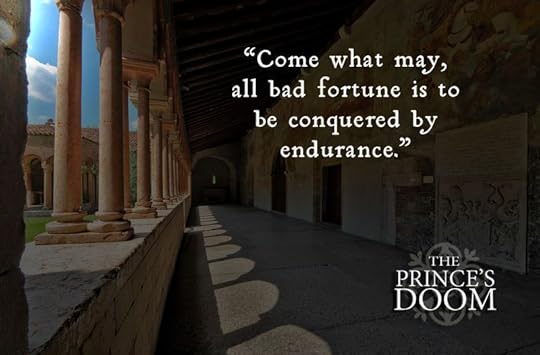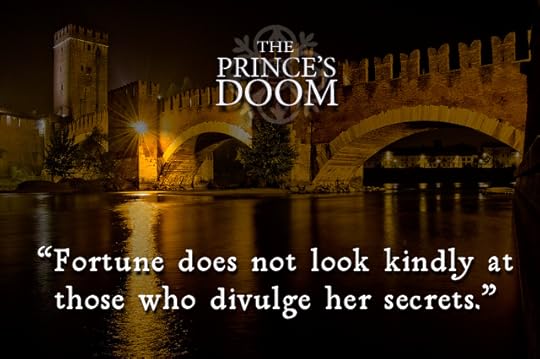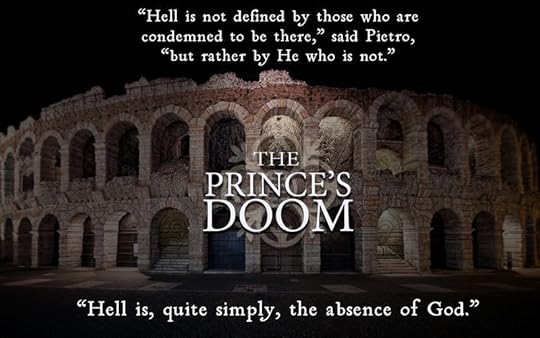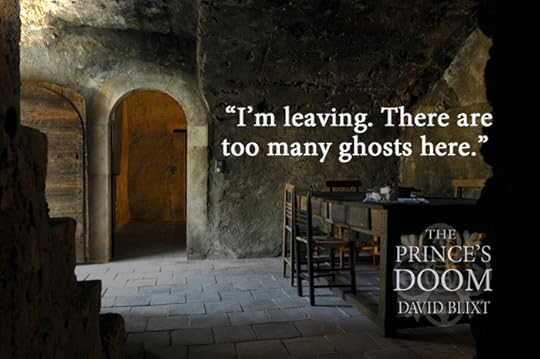David Blixt's Blog, page 7
January 28, 2015
Forget the Map, Just Explore
My kids go to a great school, and through them I get to meet other artists. One of them is a very talented short story writer. She had a banner year in 2014, and got lots of attention.
Of course, from every literary agent she talked to, she heard this: “I love your work. Send me your novel.”
So it's time for her to write a novel.
Last weekend she and I were at a school dance party. While the children were on the dance floor adorably doing the Macarena, she leaned over and said, “I’m in the first 20 pages. It’s hard.”
I gave her the same advice everyone does, the stuff she already knew by heart – just keep writing, don’t try to make it perfect, that’s what editing is for, yadda yadda. The standard stuff. But she perked up when I said, “You won’t really discover what the book is about until chapter three or four. And you won’t know how to start the book until you’ve written the end. So don’t grip the beginning too hard right now – it’s going to change. Just dive in.”
I’m speaking from experience. I’ve written seven novels by this point, and only two have the same beginning they did when I first sat down to write. It’s because I’ve found I need to be inside a thing to figure out what it is.
The natural comparison for me is acting – I can look at a role from the outside and have all sorts of ideas and opinions. But until I’m up there, speaking the words and living the part, I don’t know who that person is.
A better comparison, though, might be directing. You cast the show, choose the elements, and have all sorts of ideas. But until it’s all together, you don’t know what it will become. As you watch the characters interact, they have moments that are better than anything you’d imagined in production meetings. In that moment a good director gives the actors permission to discover. It may get cut later, it may not work for the overall show, but there is more art in discovery than in planning. Until you’re in the moment, you don’t know. And it’s okay that you don’t know! You're just the guide in an ever-shifting forest of choices. It's not the destination, but the quality of the journey.
As an author, my very favorite moments are when my characters surprise me, when I plan for a scene to go one way, and then I’m in it and they’re all, “No, David, thanks, but I'll pass on that cup of poisoned wine. I think I’ll step outside and bay at the moon instead. Why? Trust me. It’ll work.” And it does.
My best example is the ending of The Master Of Verona. I won’t go into details, because spoilers, but after 180,000 words I thought I knew what was going on. In the final confrontation, however, I learned that I was entirely wrong. As the characters spoke, they revealed what their motivations had been throughout, changing the book drastically, and for the better. After a year of writing, it all came as a complete shock to me, yet made perfect sense.
Ever since I have learned to write for truth, not to a plan. There are goalposts, of course, events I know I want to happen. And I always have an ending in my head, the event, the place where I want to wrap things up. But how I get there is a discovery, and how that ending goes it up to the characters themselves. I learn more listening to them than by telling them what to do.
Of course, sometimes I still try to force things. There are events that I have in my head so strongly that I cannot let them go. That's when the writing grinds to a halt. Rather than give the story the freedom to move in its own direction, I'm imposing something. It's deadly. The story resists, and I get mulish. Or worse, I begin to get bored.
There is nothing worse than a bored artist. If I'm not excited about what I'm writing or performing, how can I expect my audience to be excited about it?
But there is excitement in discovery. It's an electric charge that makes you lean forward and engage. Art is the act of creation, and what is creation if not discovery?
Talking about this, with the kids stepping to All About The Bass in the next room, I saw my friend visibly relax. She really liked the idea that she didn’t have to know what she was doing yet. She’s an excellent writer, but was feeling lots of pressure, both external and internal. This was her novel! The Big Thing that was the next step in her Career.
What freed her in that moment was giving herself permission to discover. You don’t know what the book is until you’re writing it. In that sense, it’s very like life. You don’t know what kind of life it is until you’re living it.
Only here you get to go back and rewrite the beginning.
Follow David on Facebook here.
January 26, 2015
We Are Not In Competition
Tonight I was engaged in a conversation I find myself having more and more. It's as infuriating as it is baffling.
I was once again trying to dispell the Myth of Artistic Competition.
I'm lucky enough to have two careers in the arts, as actor and as an author. In each, I am a part of a rich and generous community of fellow travelers. I treasure and value my colleagues, and greet their successes with real joy.
Yes, it's hard sometimes not to measure my own place on the ladder in comparison. It's only natural to feel a twinge when someone else gets that movie deal, that perfect review. But, as Dogberry says, "Comparisons are odorous." It doesn't stop me from feeling joy for my friends, who are working just as hard as I am in fields that are notoriously capricious. I am lucky, not just to be living the life, but to count these talented people as my friends.
Yet in both careers there are certain subsets who take joy in the failure of others. As if someone else falling down makes you taller.
It does not. It means there is less height in our world, and therefore fewer of us are seen.
I'm most aware of this in theatre - though less so in Chicago, where so many theatres are interconnected and there is so much work that if you want to be working, you can be. Or, if not, you create your own work and you'll find it supported. The theatre family here is truly a community (witness the communal outpouring of grief at our many recent losses). I imagine it's much the same in New York - there's so much work, your success does not equal my failure. It just means you're successful, and I'm happy for you. The more success you have, the more likely I'll have success too.
But elsewhere, in communities where the work is not as prevelant and the funding not as ready, it's different. Because everyone is vying for dollars - from donors, from foundations, and from the state (if the state gives anything at all) - there is this false sense of competition. Of having to beat the other guys. Of having to win.
Nothing could be more disastrous.
Here's the thing - if a theatre-goer loves your show on a Friday night, that makes them more likely to see my show on Saturday, or next Friday, or whenever they have the night off again. Good theatre begets more theatre. It's not like they have a choice of only one theatre to support and if you win, I lose. If they go to see your show and have a good time, we've both won. Because they're all the more likely to come back for more.
It's the same in books. I'm friends with some very successful authors (whose names I'll refrain from dropping). Their success doesn't equal my failure. If people are buying their books, that's great, because it means they're more likely to pick up mine down the road. It takes most of us around a year to crank out a book, and a reader only a few weeks (or days) to read them. By the laws of supply and demand, readers read more than one author. So if they read a bestselling book by a famous author today, they'll want to find another writer to give them the same thrill while they wait for that author's next book. It's a rising tide, it lifts all boats.
As an author, I appreciate all readers, regardless if they read me or no. As an actor, I appreciate all theatre-goers, whether they see the show I'm in or not. That they exist gives me license to do what I do. And if they are happy with what they read and what they see, they're all the more likely to come back for more.
Since it bears repeating, let me say it again - artists are not in competition with each other. We're a community. We depend upon each other to increase the appreciation of our art.
Which brings me to the other side of the coin, the sinister side, which I'll illustrate with a story: One of my friends is a very successful playwright. Awhile back he was being hassled by a fellow playwright who was not being produced nearly as much. Finally my friend looked him in the eye and said, "You should focus less on why I'm being produced, and more on why you're not."
He's exactly right. Our focus shouldn't be wasted on envy or grousing about a non-existent horse-race. Our focus should be on the quality of our own work. The worst thing that can happen is for us to produce bad art. Because, just as your theatre doing great work turns an audience on, a bad play can spoil an audience for life.
Earlier today another friend posted a pithy remark he'd heard: that the greatest threat to live theatre was Netflix. "Not so," replied my friend. "The greatest threat to live theatre is live theatre." His point was that there's so much that's being done badly and is then excused because of the effort that went into it. "Boy, they were acting their hearts out."
But if I shelled out $35 a ticket and the show was terrible, I wouldn't care if they were acting their hearts out. I'd feel like I wasted my money, and therefore I'd be less likely to shell out for another such experience.
It's not competing with good art that hurts us all. It's competing with bad art.
Same with books. If I fork over $24.95 for a book that's so terrible I put it down halfway through (and it's happened, several times), it makes me less likely to buy books. And I'm a devoted reader!
Where does bad art come from? Sometimes it's a passionate failure. Those are fine. Those are even great, because passion is never wasted. But far more often bad art comes from a combination of vanity, half-assed laziness, and chasing profit - all the wrong reasons to be in the Arts. The worst thing we can do is teach our audience to appreciate bad art.
But even when art is good, it's hard to measure. So we often boil it down to the simplest metric. In a world where we track box office scores and television ratings as indication of artistic success, it's easy to get bogged down in number games - "He got my part", "They got a $25,000 grant", "She sold 50,000 books". But in doing so we take our eyes off the ball. Their prosperity isn't stealing ours. If anything, their good fortune makes ours more likely.
Ultimately the goal isn't to emulate someone else's success. It's to find our own.
Neil Gaiman says, "Make good art."
Shakespeare says, "To thine own self be true."
I say put them together - Make good art by being true to yourself.
The Arts are not a competiton. They are a community. So long as we make good art and support each other, we are our own rising tide. We lift ourselves.
Oh, and working artists should be able to make a living wage. But that's a conversation for another day.
(Photos from the Michigan Shakespeare Festival's 2014 production of Cymbeline, directed by Robert Kauzlaric. Visit www.michiganshakespearefestival.com for more information)
Follow David on Facebook here.
January 10, 2015
Rubicon
On this day in 49 BC, Gaius Julius Caesar led a single legion, the Legio XIII Gemina, south over the Rubicon from Cisalpine Gaul to invade Italy. His own country.
I never think of this as happening in January, though it was just at the start of the Roman New Year. But the seasons were out of joint with the calendar, something Caesar Dictator would eventually rectify, giving us the Julian Calendar. So it was spring, not winter, when Caesar crossed the waters of the River Rubico.
While we naturally focus on the Ides of March to remember Caesar, this is the day that broke the Roman Republic. Pompey and Cato had forced Caesar to an impasse - either relinquish his rights and submit himself to trial for exceeding his authority in the Gallic Wars (which they accused him, with justice, of starting), or wage war on his own country.
For a man obsessed with his own dignitas, his personal share of honor and worth, it was never a choice. Yet the action of rebellion was not natural to him, and he first tried every legal means to beat his senatorial foes before resorting to the sword. Proving, to me at least, that marching on his country was an action he bitterly regretted, even as it happened.
From my play EVE OF IDES:
BRUTUS
You have regrets? I thought you were impervious to them.
CAESAR
Hardly. (beat) You know, in a way the Rubicon was Cato’s greatest victory. In that moment, I lost something. I felt it go, like a broken thing inside me.
BRUTUS
What was it?
CAESAR
A dream. My dream. Of being the greatest Roman of all time.
BRUTUS
You think you’re not?
CAESAR
Not the way I wanted. Until that moment, I had done everything properly. Served in the right number of campaigns, held every office in the proper year. I wanted to be consul a second time, then censor, then the elder statesman, possibly even Leader of the Senate. Primus inter pares. The first among equals.
BRUTUS
Now you are a god in Ephasus, a king in Aegypt, and Dictator of Rome. Undisputed ruler of the world. It’s not enough?
CAESAR
Too much... (shaking off his grim thoughts) I must thank Lepidus. This may be the best dinner conversation I’ve had in years.
According to Suetonius, Caesar uttered the famous phrase "ALEA IACTA EST" ("the die is cast"). From another point in the play, when Brutus is contemplating his own end:
BRUTUS
....What was it you said when you crossed the Rubicon? "The die is cast."
CAESAR
That's not what I said.
BRUTUS
No?
CAESAR
Far too fatalistic. I was quoting Menander. Anerriphtho kubos. “Let the dice fly high!” I embrace risk.
BRUTUS
While I resign myself to fate.
For more, pick up a copy of EVE OF IDES. 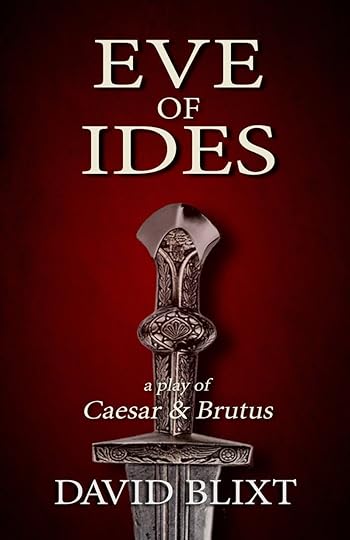
SYNOPSIS: The night before his assassination at the hands of conspirators, Julius Caesar attended a feast. With him were Brutus, Cassius, and Antony. During the meal, Caesar was asked what he thought was the best way to die. Caesar answered, 'What does it matter, so long as it's quick?' Based on history and the works of Shakespeare, Eve Of Ides reveals the unexplored relationship between the main players of the age - Caesar, Brutus, and Antony.
December 25, 2014
A Sneak Peek At THE PRINCE'S DOOM (Merry Christmas!)
PROLOGUE
Verona, Italy - Saturday, 26 November 1328
“Show me ‘yes’.”
Dark as an angry sky, the polished marble teardrop twitched, then began to describe a sinister circle.
“Show me ‘no’.”
The stone at the end of the chain adroitly changed direction. Watching, Elisabetta Contarini gasped and clutched the medal of her namesake, Santa Elizabetta of Portugal. “You’re doing that.”
“No, Madonna. Ask your questions and you will hear the truth.”
It took her a moment to parse his accent before she obeyed. “Tell me – will Soranzo survive the year?”
The question was repeated. The chain at the end of the diviner’s finger continued in the same direction. No.
Elisabetta glanced anxiously to her husband, sitting in bored submission.
“Will my husband become Doge?”
Reversing, the teardrop spun leftwards with some force. A resounding Yes.
Watching from across the room, Francesco Dandolo was annoyed with himself for feeling pleased. Everyone knew he would be the next Doge. At seventy years of age, he had certainly showed patience, serving Venice with able devotion. He had endured many hardships and perjured his soul to rise to the top of the Signoria. Barring any drastic change in Fortune’s wheel, Dandolo would be elected the moment Soranzo released the last bonds of life.
Which would happen soon, according to this man. But Dandolo refused to be drawn in by such a grotesque mountebank. He had not wanted to admit the man at all, but Zanino had been favourably impressed. As guests in an enemy city, and without invitation to the revels this night, they required amusement. If Elisabetta found the man’s trade entrancing, it did not hurt to indulge her, even if it was utter nonsense. Astrology, phrenology, numerology, palmistry, divination – fashionable pastimes. Though Doge Soranzo certainly put stock in such arts.
Not that the Doge would appreciate tonight’s prediction. While Elisabetta pressed on to more mundane matters – when the next shipment of silk would arrive, the birthdate of their latest grandchild – Dandolo tried to divine the man himself. Perhaps a soldier, crippled on some battlefield. For there had been an injury, a dreadful one. The right shoulder was badly bunched, and there was a crimp in the diviner’s left hip that forced him to rely on a heavy crutch. Worst of all was his visage. Whatever his other wounds, the left side of his face had received a devastating blow, causing his eye-socket to collapse inwards. Little wonder he kept his cowl forward. His was a face to turn the stoutest stomach.
But his voice was strong and clear, if marred by the unintelligible accent of Bergamo. His pendulum answered each question in turn. Wisely, not every answer was satisfying. Nothing makes an audience more suspicious than convenient truths.
There were clever wrinkles to the business, too. He carried a calendar, and let the pendulum hover over this date or that. He also carried a map of Italy, crudely drawn. Naples was in the wrong place. But it allowed him to answer more than simple binary questions.
After twenty minutes, Elisabetta turned to her husband. “Ask it something.”
Dandolo smiled thinly. “Why is the sky blue?”
Elisabetta pouted. “Ask it something only you would know.”
Loving his wife, he relented. “Did I eat pickled apricots yesterday?”
The man had a fifty-fifty chance, and guessed correctly. At his wife’s urging, Dandolo posed several more queries of no consequence. Each time the answer was true.
Being lucky was better than being good. Time to trick the diviner. “Did I meet the Greyhound today?”
It was well known that he had dined at the Scaligeri palace at noon, part of the many who had flooded into Verona for this momentous occasion. So when the dark pendulum tugged the chain to describe a negative, Elisabetta sighed in disappointment.
Dandolo frown. “Has Venice bestowed its citizenship upon the Greyhound?”
Again, the answer was no. Elisabetta was distraught. Venice had certainly offered citizenship to Cangrande della Scala – it had happened months ago. Everyone knew.
Not by word or gesture did Dandolo betray his sudden interest. It was a truth known only to a few that the man commonly called Il Veltro, the Greyhound, was not the true owner of that mythic title. The name belonged to his natural child, whom Dandolo had not seen today, and who had not been granted the rare privilege of citizenship.
Several more questions, pointed now. All the answers were true. Either this crippled hulk was a genius of deception, or his gift was real.
Dandolo called for wine. “Put your tool down. If we go on, you’ll flay the skin from your hand.”
The man’s finger and thumb were indeed raw, and he accepted the cup of mulled wine with surprise. He knew the pendulum had been wrong about those two questions. Yet clearly the Venetian lord’s interest had been piqued.
Dandolo sipped his favoured beverage. “I can see why Zanino insisted you call upon us. You have a rare talent. Have you always been so blessed?”
“There are some would call it a curse, my lord.”
“Of course. In Venice such things are tolerated. But many devout souls see it as witchcraft. Trading with the Devil. Is that how you came by your infirmities?”
“No, my lord. I took these many years ago, in Padua.”
“It has been a long war,” offered Dandolo. “You must be pleased to see the seal set on peace.”
The man shrugged his good shoulder. “I’m here to ply my trade. This is where the people are.”
“Where the people are indeed,” said Dandolo after navigating the man’s accent. “But you did not answer my question. Have you always been so talented?”
“No,” admitted the diviner. “It came after my injuries.”
Dandolo raised his brows. “Compensation, after a fashion.”
“Yes, lord.” Clearly uncomfortable, the cripple finished his drink, too quickly to be polite, then set it aside. “It grows late. Are there any last questions you’d like answered?”
Dandolo rose. “No, but thank you. It has been an illuminating evening.”
Elisabetta said, “O, you’re not leaving? Francesco, you should put him on retainer. Your own spy into the divine.”
Dandolo paused. There was one question to which he would like an honest answer. How to phrase it? “Tell me this. I have been made an offer by someone here in Verona. My question is twofold. One, is the offer honest?”
The chain, the teardrop, the question. For the first time, the answer was equivocal, with the pendulum swinging in all directions. The diviner apologized, but Dandolo waved him off. “It was a poor question. Here is a better one. If I accept, will it benefit Venice?”
The bob on the chain spun leftwards so hard and so fast it might have pulled itself from the diviner’s fingers.
Dandolo’s mouth twitched. “Thank you. My mind is quite made up. Zanino will see you paid. One more thing. Should I seek your services again, where shall I find you?”
“I’m at the Duo Gentes, lord.”
“And what was your name?”
“Girolamo of Bergamo, my lord.”
“Thank you, Girolamo, for a most illuminating evening.”
As an excited Elisabetta raced to her closet to pen letters to her daughters, Dandolo waited until Zanino returned. How distressing, to see the first streaks of grey in his own son’s hair. The only son left to him, regrettably not by his wife. But it is a foolish man who places all hope of posterity in one womb.
“I hope your guest amused Donna Elisabetta, my lord.”
“Mightily. Now, as to the other matter. Send word to our Veronese friend – we accept.”
December 24, 2014
Gratitude
2014 has been pretty astonishing. There is so very much to be grateful for, and so much to rail at the heavens over. But I'm going to focus on the things I'm grateful for tonight.
The Michigan Shakespeare Festival had a truly stellar season. Under my wife's guidance, it's become the place great people want to spend their summers. And that's largely due to the team efforts of a bevvy of Blixts and a Bennett. My mother joined the MSF board a few years back, and she's the real driving force these days, with my father pitching in to help when she needs a project finished. There's me, of course. And there's Nona Bennett, the MSF general manager. Thankfully we have wonderful new board members this year, who are as enthusiastic as humanly possible. In a year that saw so many theatres closing their doors, I'm grateful that we are not only producing but producing so well.
Oh, and there were a ton of Wilde awards, one of which I won. That was surreal. I remember being utterly flummoxed at winning EMU's Distinguished Young Alumnus award a few years back. This was much the same. Jan had already used the only speech I had considered giving as she accepted her award, so I got up there and winged it. For someone who likes to hold forth as often as I do, I am apparently bad at giving speeches. At least, in English.
Then there was the Verona trip. 14 years ago I had a fantasy about the city of Verona making a fuss over me for the book I was writing. The reality far exceeded the fantasy. And it's due in very large measure to Anna Lerario, Veronese film-maker and soul of creativity and perseverance. Along with her husband Antonio Bulbarelli, Anna contacted me in 2013, having just completed her documentary about Cangrande. Wisely, she had refrained from reading my work until after her film was complete. But once she did read THE MASTER OF VERONA, she reached out at once to ask if she could use the title for the English language version of her film. Seeing the film, I agreed at once. I did a little work on the English translation for the film, and she reciprocated by making a book trailer from the footage of her Veronese films. Suddenly we were thick as thieves, releasing a joint book/dvd edition of our works.
Then Anna reached out to Gianni La Corte at La Corte Editore, asking on my behalf if he’d be interested in publishing an Italian version of MOV. Gianni was enthusiastic from the start, and turned it around in record time. Anna arranged for the City of Verona to pay my passage. So, for the first time since our son was born, Jan and I headed to Verona to see old friends and make new ones as we promoted the Italian release of my first novel, something I had always dreamed of.
Gianni is a delight, and arranged for me to be a part of the Torino Book Fair, an international book expo that attracts 40,000 people each year. I made so many friends that day, and was thrilled that my old friend Chuck decided to make a 13-hour drive from Germany, where he's stationed, to spend the day with us.Through Anna and Antonio I did TV and radio interviews, met dignitaries and scholars like Giovanni Rapelli, who went with us on our tour of Santa Maria in Stelle. I met the cook Gioco, as well as the very real Yuri and Fabio – Yuri actually played Cangrande in Anna’s film, so it was fun for me to put him into this book as one of Cesco’s Rakehells. Certainly our nights out in Verona were memorable – or would be, if I hadn’t drunk so deeply.
I got to meet other Veronese friends in person: Marina Bonomi, David Osborne and his lovely wife. And through Anna I met Joyce Stewart, an American journalist and ex-pat living in the best apartment I have ever seen, a stone’s throw from the Arena. We were lucky enough to be welcomed into her home for most of our stay. She's quite wonderful. As Jan put it, "She's tribe."
There were only two nights not spent at Joyce's place. One was in Torino. The other was our night at La Foresteria on the estate of the Serego-Alighieri family – an estate bought by Pietro in 1353. After a gap of twelve years, Jan and I were again able to interview the Count, this time for pleasure, not work. He told us marvelous stories of his father, and I was able to give him copies of all the novels I had written about his ancestor, including the newly-published Italian version of The Master Of Verona, rechristened Il Cavaliere Della Profezia Di Dante. The reality was better than the dream.
Back at home, there are several people that I'm simply grateful to have in my life. There's the Patches, past and present. I love just getting together to play with you jerks. In the face.
There are the MSFers, from the Summer performers to the MiSFits. I love you guys. Truth is truth.
There's Tara Sullivan, godmother to our kids and our closest friend. She's off on a new adventure now, but we were blessed to have her stay with us while she wrapped up her time in Chicago. Love you, T.
There's Joe Foust who, aside from being a talented bastard, the bravest man I think I have ever known. He suffered an unendurable loss, and has been an astonishing model of honest and open grief and love. Love hard, people. Follow Joe's example.
There's Rick Sordelet, who I've not been in a room with in two years, and yet talk to constantly. Partner, brother, co-conspirator, he's the best.
There's Alice Austen, with whom I cannot have a short conversation because once the ideas start flowing, they are unstoppable. She just finished a successful Kickstarter for her film GIVE ME LIBERTY, and last week she asked me to come and work on the film. Yes, please.
There are new friends, like Adam Felber and Joe Zettelmaier, and old friendships being renewed and deepened, like with Shawn Pfautsch and Kate and Jeromy Hopgood.
There's my friendship with my fellow travelers, the authors with whom I am able to converse and share in their successes and frustrations - more the former, thankfully. Sharon Kay Penman, Chris Gortner, Patricia Bracewell, Gillian Bagwell, Donna Russo Morin, Helen Hollick, Stephanie Dray, Jane Steen, Kate Quinn, MJ Rose, Leslie Carroll, Marci Jefferson, Sophie Perinot, Michelle Moran, Stephanie Cowell, and so many, many more. Go out and find their books. You will not be disappointed.
There are my folks, who are an endless sea of support for Jan and me, on every level. I love seeing them successful in what they put their hands to. Very much my models for how to exist in this world.
There are my kids, who are just too good to be true. Waiting for the other shoe to drop on that one. Dash is genuinely nice, taking the weight of the world on his shoulders when he should be far less selfless. Fortunately for him, Evie is going to own the world. While I'm at it, I'm grateful for their school, which is utterly fantastic. Which leads me to thank Diane Fairchild, who introduced us to it.
Ultimately, I am thankful for being allowed to share my life with my wife. She is the perfect compliment to me, which I doubt is a compliment to her - that she succeeds in keeping the practical side of our lives together while still managing to excell at her creative endeavors and run two theatre companies - well, for those that know her, it's hardly surprising. But to have someone with whom this is so very - easy? Love isn't easy, but it should never have to be hard. It is never hard for me to love her. It's the simpliest thing I've ever done, and the most rewarding.
If you've read this far, I'm grateful to you, too. I'm grateful to everyone who reads, let alone reads the children of my brain. And I'm grateful for being allowed and able to tell the stories that live in my head, be they on stage or on paper.
So, while 2014 was hard in so many ways, I am grateful.
Thank you.

